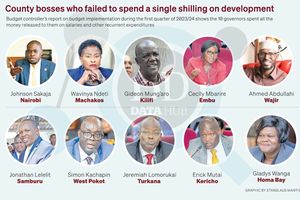
Controller of Budget Margaret Nyakang’o and Council of Governors Chairperson Anne Waiguru (inset). Council of Governors is now defending 10 governors who were found by the CoB not to have spent a single shilling on development.
The Council of Governors (CoG) has defended county bosses who failed to spend any money on the development of their counties between July and September, blaming it on lengthy procurement processes, settlement of pending bills, and delays by Parliament to enact a Bill to allocate counties additional funds.
While the governors’ umbrella body did not deny the fact that the 10 county bosses only prioritised spending billions of shillings they received on salaries and settling other recurrent expenditure, it shifted blame to other factors.
The CoG, in a statement yesterday, raised four issues that caused the counties not to spend money on development activities.
“County governments in good financial practice and the COB’s (Controller of Budget) advisory, pay off pending bills before funds are released to counties for development expenditure. A majority of these pending bills are on development,” the statement by CoG Chairperson Anne Waiguru indicated.
The COB data, however, showed that as of September 30, the recurrent pending bills topped the debt basket at Sh129 billion out of the Sh163.6 billion.
The report further shows that during the three months when the 10 counties failed to spend on development, only four of them paid part of their pending bills, with the remaining six not reporting any settlement of pending bills.
The 10 counties that did not spend anything during the last quarter on development are Nairobi, Homa Bay, Embu, Kericho, Kilifi, Machakos, Turkana, Samburu, Wajir, and West Pokot.
Out of these, Embu (Sh314.9 million), Kericho (Sh4.2 million), Machakos (Sh133.31 million), and Samburu (Sh34.23 million) were the only counties that settled part of their pending bills.
“At the beginning of the financial year 2023/24, the County reported a stock of pending bills amounting to Sh107.33 billion. The County Treasury did not provide a report on the status of pending bills as of September 30, 2023,” the COB reported on Nairobi County.
The COB also added that despite Homa Bay County having pending bills amounting to Sh1.01 billion by the start of July, “The County Executive, as well as the County Assembly, did not settle any pending bills during the reporting period.”
The CoG also blamed Parliament for delays in enacting the County Governments Additional Allocations Bill, 2023 which constrained the disbursement of conditional grants to counties, limiting their ability to spend on development.
“It is important to note that most of the ongoing development projects are funded by these grants,” Ms Waiguru said.
This is, however, not what the respective budgets of the counties reflect, since the amounts the 10 counties planned to fund their development budgets using conditional grants during the year ending June 2024 is below half for all the counties.
This implies that the majority of the funds the counties require to implement development projects will be from other sources, and not from conditional grants.
Nairobi County, for instance, plans to use conditional grants to fund only 4.3 per cent of its Sh14 billion development budget, with the rest coming from other sources.
In terms of proportion of conditional grants to full development budgets of the counties, all the other nine counties planned to use the conditional grants to fund less than their development budgets by 15.6 per cent (West Pokot), Kericho (18.3 per cent), Machakos (21 per cent), Homa Bay (24 per cent), Kilifi (31 per cent), Samburu (32 per cent), Wajir (34.4 per cent) and Embu (42.3 per cent).
If the 10 counties planned to use the majority of funds from other sources to fund development, it is not clear why they cite the delay of the release of conditional grants as an excuse.
The COB observed that counties were being affected in the implementation of their budgets due to Parliament’s delay in approving the County Governments Additional Allocations Bill, 2023.
All 47 counties were allocated Sh42.64 billion as additional allocations for conditional grants in the current financial year.
“Further delays by Parliament to enact the Bill will adversely affect budget implementation. The OCOB, therefore, advises Parliament to expedite the enactment of the County Governments Additional Allocations Bill, 2023, to enable county governments to access conditional grants to implement their budgets,” COB Margaret Nyakang’o said.
The CoG also blamed the failure of the 10 governors to complex procurement processes which slowed down the uptake of development expenditure.
“County governments recognise the importance of ensuring that procurement procedures are meticulous, transparent and adhere to the law in the spirit of accountability to the people we serve. Currently, it takes about four months to complete a procurement process,” Ms Waiguru, also the Kirinyaga Governor, stated.
The law requires that all public entities, including counties, use the Integrated Financial Management Information System (Ifmis) for procurement purposes.
The CoG did not explain why 37 counties were able to undertake procurement during the quarter when it explained that it took four months to complete a procurement process.
“All expenditures by county governments must also be approved by the COB in line with the Constitution. Therefore, expecting the uniform implementation of this expenditure thereof is not only impractical but also irregular,” the CoG said.







